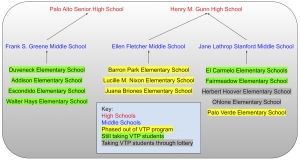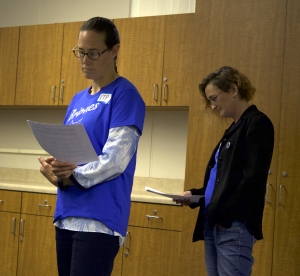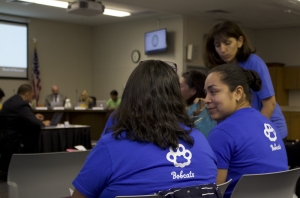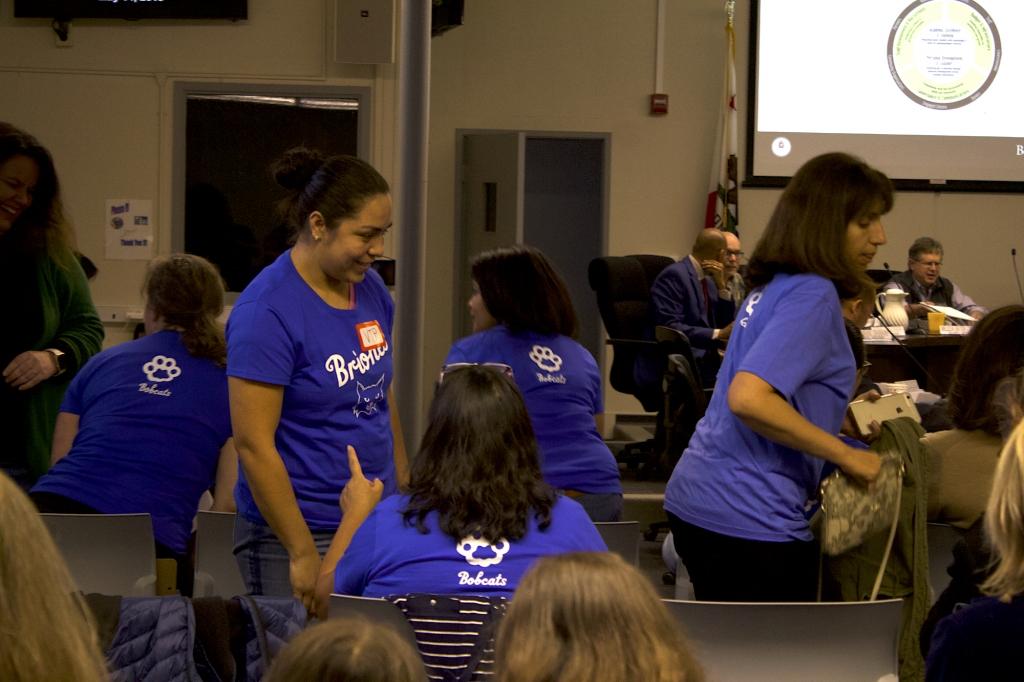The decision to consolidate Palo Alto Unified School District Voluntary Transfer Program students to fewer schools is facing push back from some elementary school parents.

As of this fall, no new VTP families will be enrolled at Palo Verde, Barron Park, Juana Briones and Lucille M. Nixon elementary schools. According to a digitally posted Facts and Questions page at pausd.org, these changes are part of a plan to reduce racial isolation and extensive busing times these students may face.
VTP families from these schools were asked to transfer to Duveneck, Addison, Walter Hays, El Carmelo, Fairmeadow or Escondido elementary schools. These schools will only receive an average of “two to three” more VTP students per class, explained PAUSD Director of Academic Supports Dr. Judy Argumedo.

According to Argumedo, these changes come after a report from the Minority Achievement and Talent Development Advisory Committee, of which she was a member. Through surveys, interviews and focus groups they determined that racial isolation and extreme daily travel times via school busses from East Palo Alto to South Palo Alto schools had negative implications for students.
At the Tuesday Board of Education meeting, 13 community members — most of whom were Juana Briones and Barron Park parents — spoke in open forum against the decision to phase out VTP students from these schools.
“Juana Briones is a close community, the people are diverse and the PTA united in their support of teachers and staff. They feel like my family,” Gabriella Segura, a PAUSD parent of 18 years, said to the board. “When I chose the VTP program for my family I knew how long the bus ride was, but I chose this as the best option for my family … Why didn’t the District even speak to us that this was being investigated?”
“Juana Briones is a close community, the people are diverse and the PTA united in their support of teachers and staff. They feel like my family.”
— Gabriella Segura, parent and grandparent
Many claimed the district lacked transparency in making the changes.
The changes made were only announced via a short letter to involved VTP families. Initially, families were told, if they wanted to remain at their current elementary schools past the 2020-21 schools year they would have to provide their own transportation as busses would no longer be running to those schools. However, Argumedo said the district has plans to reevaluate the situation after those first two years to determine whether or not to continue busing.
“Busing will most likely continue for the students still at those sites,” she stated in an email. “It could be a smaller bus if the numbers are low.”
Both community members and district staff recognized the fall down in communication on the part of PAUSD in announcing these changes.
“I do think that there was a breakdown in communication and transparency from the district, which meant that these changes came as a shock to many parents,” PAUSD Board of Education trustee Shounak Dharap stated in an email. “We need to do a better job keeping our families involved in the decisions that affect their students and allowing them opportunities to provide feedback.”
Argumedo says her team is currently reexamining their methods of communication and intend to hold further community meetings to inform families of significant decisions.

“I do think that this decision could have been communicated more effectively and I’m taking this office and the district is taking all of that into consideration and really seeing about how this can roll out better,” Argumedo said.
Dharap said he believes the benefits of these changes outweigh the loss of diversity some elementary schools will face as they lose VTP students.
“While it is important to foster diversity in all our schools, the most important consideration in making this change is the well-being of VTP students,” he wrote. “If, as a result of this change, VTP students do not have to spend over an hour on the bus to school and do not suffer from isolation in their schools, it is worth a corresponding loss in overall diversity.”
According to Argumedo, the district chose to phase out VTP enrollment at schools with the lowest numbers of VTP students. These also happened to be the schools furthest away from East Palo Alto due to the high rate of transfer requests filed, most citing ‘transportation’ hardships.
“I struggled with this. This is not an easy decision,” she said. “But in the end I had to go back to my core values and I want the best student experience for the VTP students and I think that after it all balances out if the students have, feel better, feel safe like I said emotionally and physically … Because I do understand. I mean I really am happy that some of the communities are fighting to keep them.”
“I struggled with this. This is not an easy decision.”
— Judy Argumedo, Director of Academic Supports
On Thursday over 100 VTP community members attended a potluck dinner information session hosted by the Palo Alto Council of Parent Teacher Associations and the Latino Parent Network. In attendance was Argumedo and Superintendent Dr. Don Austin, Board of Education trustees Dharap, Jennifer DiBrienza and Melissa Baten Caswell, along with senior district staff and principals from eight elementary schools. Following an informational presentation from Argumedo, community members addressed her with questions.
Additional reporting by Asia Gardias





